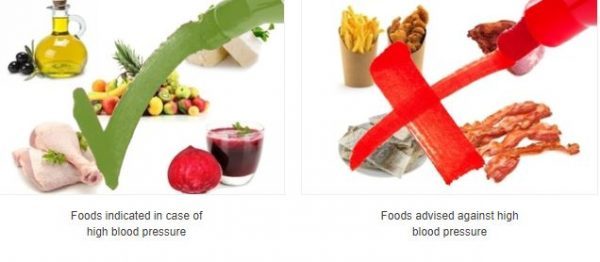Food is an important part of the treatment of high blood pressure and some care should be taken daily, such as avoiding fried and industrialized foods such as sausages and party snacks, giving preference to vegetables and fresh fruits.

In addition, people who suffer from high blood pressure should also increase their water intake by drinking between 2 liters and 2.5 liters a day and doing regular exercise, such as walking or running, at least 3 times a week.
Most indicated foods in case of high blood pressure
The foods most indicated for lowering high blood pressure are:
- All fresh fruits;
- Cheese without salt;
- Olive oil;
- Coconut water;
- Whole grains;
- Beet juice;
- Ingest at most 3 eggs per week. Also count the eggs present in the culinary preparations, such as cakes and pies;
- Raw and cooked vegetables;
- Meats like duckling, soft cushion, hard cushion, lizard, rump, breast; chicken, turkey and chester without skin (remove before cooking);
- Light yogurts.
A very important tip for people suffering from hypertension is to restrict salt intake and it is a good idea to cook a wide variety of spices and herbs to add flavor to food.
Foods advised against high blood pressure
Foods that are not recommended for high blood pressure are:
- Frying in general;
- Cheese like parmesan, provolone, Swiss;
- Ham, mortadella, salami;
- Foods high in fat. Look closely at food labels;
- Inlaid and canned foods, such as smoked sausage, avocado;
- Sweets;
- Pre-cooked or canned vegetables and vegetables;
- Dried fruits such as peanuts and cashews;
- Sauces such as ketchup, mayonnaise, mustard, shoyo;
- Seasoning cubes ready for cooking;
- Meats such as hamburger, bacon, jerky, sausage, jerky;
- Kids, pates, sardines, anchovies, salted cod;
- Pickles, olives, asparagus, palm hearts;
- Alcoholic beverages, soft drinks, milk shake, energy drinks, artificial juices.
These foods are high in fat or sodium, which promote the accumulation of fat plaques inside the arteries, making it difficult for blood to pass through and therefore increasing the pressure and therefore should be avoided daily. See other tips on: How to decrease salt intake.
